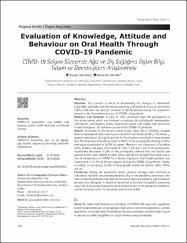| dc.contributor.author | Keles, Zeynep Hale | |
| dc.contributor.author | Sancakli, Hande Sar | |
| dc.date.accessioned | 2021-03-31T20:25:27Z | |
| dc.date.available | 2021-03-31T20:25:27Z | |
| dc.date.issued | 2020 | |
| dc.identifier.issn | 2149-9063 | |
| dc.identifier.uri | https://doi.org/10.4274/meandros.galenos.2020.60352 | |
| dc.identifier.uri | https://hdl.handle.net/20.500.12900/31 | |
| dc.description | Keles, Hale/0000-0003-3793-4512 | en_US |
| dc.description | WOS:000597417800007 | en_US |
| dc.description.abstract | Objective: This research is aimed at determining the changes in individuals' knowledge, attitudes and behaviours regarding oral health in terms of nutritional habits, daily oral care and the provision of dental services during the quarantine process in the Coronavirus disease-19 (COVID-19) pandemic. Materials and Methods: A total of 1010 volunteers (age>18) participated in this online survey which was designed to evaluate the participants' demographic information, oral hygiene habits, experiences about oral health and nutritional trends throughout the lockdown period of the COVID-19 pandemic. Results: According to the dietary habits scores, there was a tendency towards dietary consumption that would positively affect oral health (0.381 +/- 1.76) (mean +/- standard deviation). During this period, 11.4% of women and 20.2% of men smoked less. The frequency of brushing teeth in 20.6% of the participants, flossing in 9.4% and using mouthwash in 28.7% increased. Moreover, the frequency of brushing teeth, flossing and using mouthwash in 7.8%, 7.1% and 7.5% of the participants, respectively, decreased. 67.8% of the participants believed that oral health and general health were related to each other, and 80.5% thought that there was a risk of transmission of COVID-19 in dental treatment. Oral health problem was experienced in 21.7% of the participants during the COVID-19 pandemic. Finally, according to our survey, 25.6% of these people visited the dentist, while 74.4% did not. Conclusion: During the quarantine period, positive changes were observed in individuals' nutrition and smoking behavior. Due to the pandemic, individuals who had oral health problems had reservations about seeking treatment, and treatment services were disrupted. It would be beneficial to increase the public's awareness about the re-planning of dental treatment services due to the pandemic conditions, and the measures taken for the protection of oral health. | en_US |
| dc.language.iso | eng | en_US |
| dc.publisher | Galenos Yayincilik | en_US |
| dc.rights | info:eu-repo/semantics/openAccess | en_US |
| dc.subject | COVID-19 | en_US |
| dc.subject | quarantine | en_US |
| dc.subject | oral health | en_US |
| dc.subject | oral hygiene | en_US |
| dc.subject | public health dentistry | en_US |
| dc.subject | nutritional surveys | en_US |
| dc.title | Evaluation of Knowledge, Attitude and Behaviour on Oral Health Through COVID-19 Pandemic | en_US |
| dc.type | article | en_US |
| dc.department | İstanbul Atlas Üniversitesi, Diş Hekimliği Fakültesi | en_US |
| dc.department-temp | [Keles, Zeynep Hale] Istanbul Atlas Univ, Dept Restorat Dent, Fac Dent, Istanbul, Turkey; [Sancakli, Hande Sar] Istanbul Univ, Dept Restorat Dent, Fac Dent, Istanbul, Turkey | en_US |
| dc.contributor.institutionauthor | Keles, Zeynep Hale | |
| dc.identifier.doi | 10.4274/meandros.galenos.2020.60352 | |
| dc.identifier.volume | 21 | en_US |
| dc.identifier.issue | 3 | en_US |
| dc.identifier.startpage | 222 | en_US |
| dc.identifier.endpage | 231 | en_US |
| dc.relation.journal | Meandros Medical And Dental Journal | en_US |
| dc.relation.publicationcategory | Makale - Uluslararası Hakemli Dergi - Kurum Öğretim Elemanı | en_US |

















